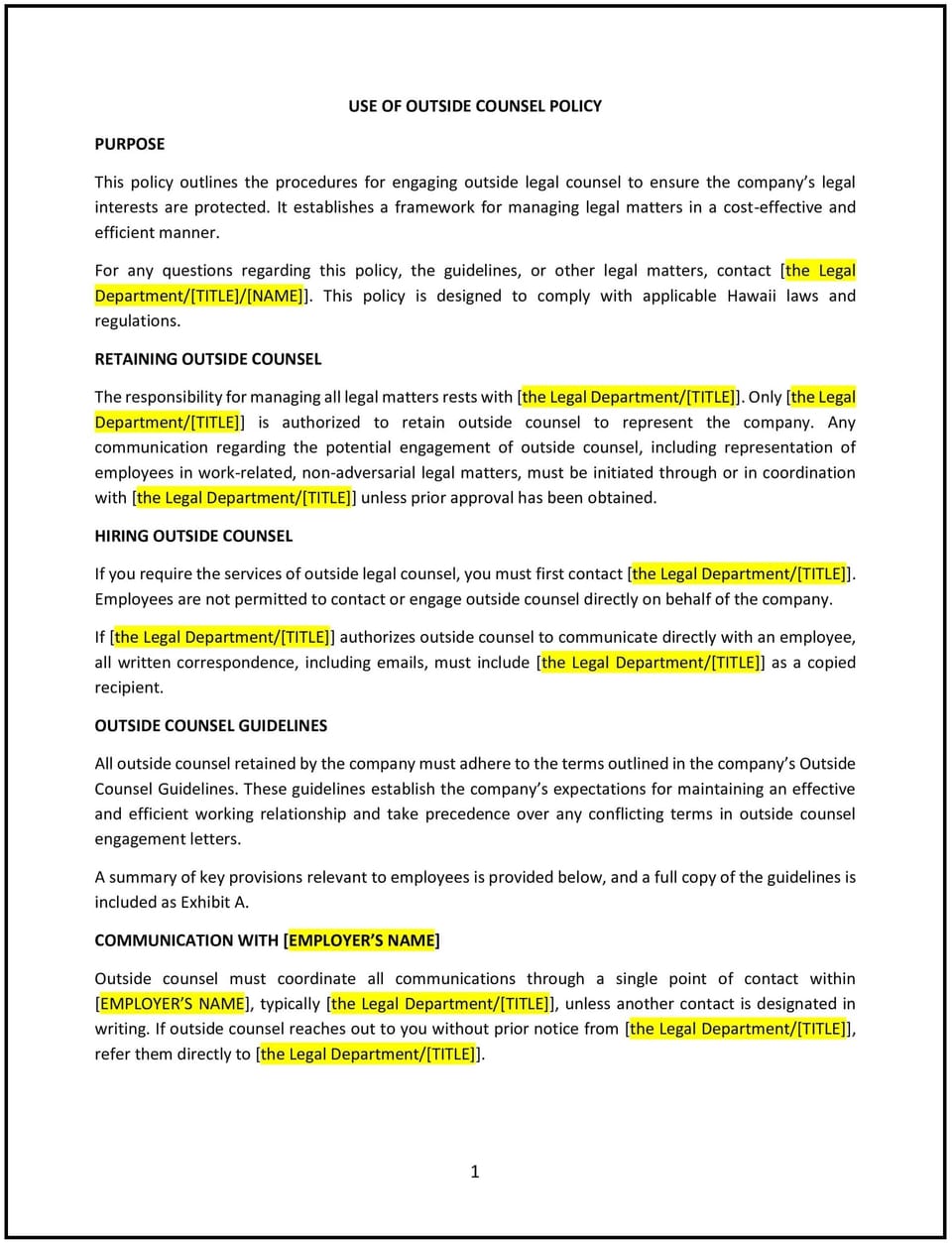Use of outside counsel policy (Hawaii): Free template

Use of outside counsel policy (Hawaiʻi)
A use of outside counsel policy helps Hawaiʻi businesses establish clear guidelines for engaging external legal professionals to address specific legal needs. This policy outlines procedures for selecting, managing, and collaborating with outside counsel, while considering Hawaiʻi’s unique legal and business environment. It is designed to promote cost-effective legal solutions, ensure alignment with business goals, and maintain strong relationships with external legal partners.
By implementing this policy, businesses in Hawaiʻi can access specialized legal expertise, manage legal expenses, and protect their interests effectively.
How to use this use of outside counsel policy (Hawaiʻi)
- Define when to use outside counsel: Clearly outline the circumstances under which outside counsel should be engaged, such as for specialized legal matters, litigation, or regulatory issues.
- Establish selection criteria: Provide guidelines for selecting outside counsel, including evaluating their expertise, reputation, and alignment with business values.
- Set expectations: Outline the roles, responsibilities, and performance standards expected of outside counsel, such as communication protocols and reporting requirements.
- Address cost management: Specify procedures for managing legal expenses, including budgeting, billing guidelines, and approval processes.
- Maintain communication: Describe how internal teams and outside counsel should collaborate, including regular updates and feedback mechanisms.
- Monitor performance: Establish criteria for evaluating outside counsel’s performance, such as responsiveness, quality of work, and cost-effectiveness.
- Communicate the policy: Share the policy with relevant stakeholders, including internal teams and outside counsel, to ensure clarity and alignment.
- Train employees: Educate employees on the policy’s guidelines, including when and how to engage outside counsel.
- Review and update the policy: Periodically assess the policy’s effectiveness and make adjustments as needed to reflect changes in business needs or legal requirements.
Benefits of using this use of outside counsel policy (Hawaiʻi)
This policy offers several advantages for Hawaiʻi businesses:
- Access to specialized expertise: Outside counsel provides legal knowledge and skills that may not be available in-house.
- Cost management: Clear guidelines for budgeting and billing help businesses control legal expenses and avoid unexpected costs.
- Improved efficiency: Structured procedures for engaging and managing outside counsel streamline legal processes and save time.
- Enhanced collaboration: Defined communication protocols ensure effective collaboration between internal teams and outside counsel.
- Risk mitigation: Access to experienced legal professionals helps businesses address complex legal issues and reduce risks.
- Alignment with business goals: The policy ensures outside counsel’s work aligns with the business’s objectives and values.
- Builds strong relationships: A clear and fair policy fosters trust and long-term partnerships with external legal professionals.
Tips for using this use of outside counsel policy (Hawaiʻi)
- Communicate the policy effectively: Share the policy with relevant stakeholders, including internal teams and outside counsel, to ensure clarity and alignment.
- Set clear expectations: Clearly outline roles, responsibilities, and performance standards for outside counsel to avoid misunderstandings.
- Monitor costs: Regularly review legal expenses and ensure outside counsel adheres to billing guidelines and budgets.
- Foster collaboration: Encourage open communication and regular updates between internal teams and outside counsel.
- Evaluate performance: Use defined criteria to assess outside counsel’s performance and provide feedback for improvement.
- Review the policy periodically: Update the policy as needed to reflect changes in business needs, legal requirements, or relationships with outside counsel.
Q: Why should Hawaiʻi businesses adopt a use of outside counsel policy?
A: Businesses should adopt this policy to access specialized legal expertise, manage legal expenses, and ensure alignment with business goals.
Q: When should businesses engage outside counsel?
A: Businesses should engage outside counsel for specialized legal matters, litigation, regulatory issues, or other situations requiring external expertise.
Q: How should businesses select outside counsel?
A: Businesses should evaluate outside counsel based on their expertise, reputation, alignment with business values, and cost-effectiveness.
Q: What should businesses include in agreements with outside counsel?
A: Agreements should outline scope of work, billing rates, communication protocols, and performance expectations.
Q: How can businesses manage legal expenses effectively?
A: Businesses should set budgets, establish billing guidelines, and regularly review legal expenses to control costs.
Q: How should businesses collaborate with outside counsel?
A: Businesses should maintain regular communication, provide clear instructions, and establish feedback mechanisms to ensure effective collaboration.
Q: How often should businesses review the policy?
A: Businesses should review the policy annually or as needed to reflect changes in business needs, legal requirements, or relationships with outside counsel.
This article contains general legal information and does not contain legal advice. Cobrief is not a law firm or a substitute for an attorney or law firm. The law is complex and changes often. For legal advice, please ask a lawyer.


